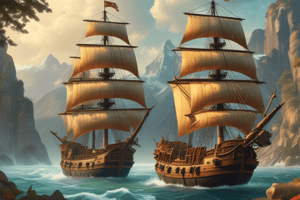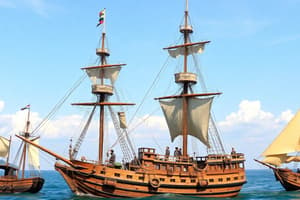Podcast
Questions and Answers
A colony is a settlement ruled by a nearby government.
A colony is a settlement ruled by a nearby government.
False (B)
Explorers sought new trade routes to acquire resources like gold and spices.
Explorers sought new trade routes to acquire resources like gold and spices.
True (A)
Indies refer to Europe as a whole.
Indies refer to Europe as a whole.
False (B)
Christopher Columbus was sponsored by France to sail west.
Christopher Columbus was sponsored by France to sail west.
Signup and view all the answers
Henry Hudson's discoveries encouraged Europeans to settle in the New World.
Henry Hudson's discoveries encouraged Europeans to settle in the New World.
Signup and view all the answers
Giovanni da Verrazzano was the first European to encounter the Lenape people.
Giovanni da Verrazzano was the first European to encounter the Lenape people.
Signup and view all the answers
The cargo refers to the amount of goods that are offered for sale.
The cargo refers to the amount of goods that are offered for sale.
Signup and view all the answers
Slavery is the practice of holding people against their will and forcing them to work for a wage.
Slavery is the practice of holding people against their will and forcing them to work for a wage.
Signup and view all the answers
Flashcards
What is a colony?
What is a colony?
A settlement that is ruled by a distant government.
Who is an explorer?
Who is an explorer?
A person who travels to unknown places, often in search of valuable things.
What is demand?
What is demand?
The need for a good or product by people willing to pay for it.
What is cargo?
What is cargo?
Signup and view all the flashcards
What is supply?
What is supply?
Signup and view all the flashcards
What is slavery?
What is slavery?
Signup and view all the flashcards
What is a compass?
What is a compass?
Signup and view all the flashcards
What is trade?
What is trade?
Signup and view all the flashcards
Signup and view all the flashcards
Study Notes
Explorers Test Study Guide
- Colony: A settlement controlled by a distant government.
- Explorer: A person who travels to unknown places, usually seeking valuable items.
- Demand: The need for a good or product, with people willing to pay.
- Cargo: Goods transported by a ship, plane, truck, or other vehicle.
- Supply: The amount of a good available for sale.
- Slavery: The practice of forcing people to work without pay.
- Compass: A tool for navigation on the sea.
- Trade: The exchange of goods or services.
- New World: A term sometimes used for North and South America.
- Indies: China, India, and Japan.
Four Reasons for European Exploration
- Gold: Seeking new resources (gold, spices, silk), and new trade routes.
- God: Spreading Christianity.
- Glory: Gaining power and land for a nation.
Reasons for Seeking Better Routes to Asia
- Wealth and trade of valuable goods (gold, jewels, silk, spices).
How Early Explorers Helped Future Voyagers
- Created maps.
- Established settlements.
- Learned about different routes and cultures.
- Documented information about new places.
How Explorers Encouraged Immigration to the New World
- Described new lands, resources, and trade opportunities.
- Reported on natural resources abundant in the New World.
- Showed that trading and settling in the New World was possible.
- Inspired people with stories of adventure and wealth.
John Cabot
- Founded Newfoundland, an area rich in fish.
- Was an English spice trader.
Giovanni da Verrazzano
- Sponsored by King Francis I of France.
- First European to encounter the Lenape people.
- Died by a cannibal tribe.
- Explored the coast of what is now New York Bay.
Henry Hudson
- Possibly the first explorer to reach present-day New Jersey.
- His ship was called the Half Moon.
- Sponsored by the Dutch East India Company.
Studying That Suits You
Use AI to generate personalized quizzes and flashcards to suit your learning preferences.
Related Documents
Description
This quiz focuses on key concepts related to early explorers, their motivations, and the impact of their discoveries. Topics include the reasons for European exploration, trade goods, and the practices of colonization and slavery. Test your knowledge on these historical terms and their significance in shaping the New World.




